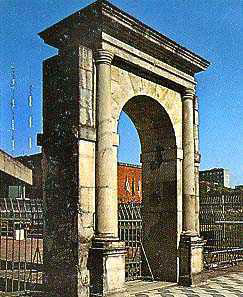 |
| The Tiradentes Prison, where political prisoners were incarcerated during the New State (1937-45) and the military dictatorship (1964-85), was demolished in 1972, leaving only the entrance arch, listed in 1985 as a cultural historic interest "by the symbolic value that it represents for the fight against will and institutionalized violence in our country in the recent past." |
The IEA-USP will present some recent research contributions on the construction, consolidation and preservation of social and political memory in Brazil, Argentina and South Africa at the seminar Memory, Memorials and the Future of Democracies, to be held from November 12 to 14 at the Institute. (see the programme).
According to the organizers, the fundamental proposition of the meeting is to discuss the work done by memorials and museums, and research on memory - which rely on different strategies and methodologies - and thereby "capture what can not be captured: traits, remains and reminiscences that somehow refuse their own continuance."
When applied to memory, the acts of preserving, maintaining and containing reveal "the efforts to stay due to all of what resisted to the full objectification to be sparsely found on bodies, testimonies, archivable erasures and leftovers, and failures of what can be remembered."
The seminar is sponsored by IEA-USP's UNESCO Chair in Education for Peace, Human Rights, Democracy and Tolerance, and the Center for the Study of Diversity, Conflict and Intolerance (Diversitas) of USP's Faculty of Philosophy, Letters and Human Sciences (FFLCH), with support from CNPq, FAPESP and two of USP units: the Faculty of Education (FE) and the Institute of Psychology (IP).
The event will be broadcast live on the web.
PROGRAMME
November 12
3 pm — Internal meeting for organizers, executive commission e foreign guests
7 pm — Opening — Memory, Memorials and the Future of Democracies
Participants: Flavia Schilling, from the FE-USP; Paulo Endo, from the IP-USP and USP's Graduation Program for Humanities, Law and other Legitimacies; Sergio Adorno, director of FFLCH and coordinator of IEA-USP's UNESCO Chair in Education for Peace, Human Rights, Democracy and Tolerance; and Zilda Iokoi, from FFLCH, where she coordinates the Center for the Study of Diversity, Conflict and Intolerance (Diversitas).
8 pm — Recital with the Campinas Guitar Camerata
November 13
10 am — Roundtable I — Memory of Women: Body and Resistance
Exhibitors: Janine Gomes da Silva (Federal University of Santa Catarina), Graciela Jorge (Human Right Secretary of the Recent Past, Uruguay) and Susel Oliveira da Rosa (Federal University of Paraíba)
Coordination: Flavia Schilling (USP's Faculty of Law)
3 pm — Roundtable II — Memory, History and Testimony Culture
Exhibitors: Janaína de Almeida Teles, from the State Institute of Studies on Violence; Marcio Selligmann-Silva, from UNICAMP's Institute of Language; and Katia Neves, from the Resistance Memorial of São Paulo.
Coordination: José Sergio de Carvalho (FE-USP).
November 14
10 am — Roundtable III — History, Memory and Culture
Exhibitors: Deisy Ventura, from USP's Institute of International Relations (IRI), and Eduardo Bittar, from USP's Faculty of Law.
Coordination: Belisário dos Santos Junior, vice-president of the Order of Attorneys of Brazil (OAB). (to be confirmed)
3 pm — Roundtable IV — Memorials, Archive and Democracy
Exhibitors: Lilia Victoria Pastoriza, coordinator of content at the Instituto Espacio para la Memoria da Escuela de Mecánica de la Armada (Argentina); Garth Stevens, from the University of the Witwatersrand (South Africa); and Umesh Lalloo Bawa, from the University of the Western Cape (South Africa).
Coordination: Paulo Endo, from the IP-USP and USP's Graduation Program for Humanities, Law and other Legitimacies.
6 pm — Closure